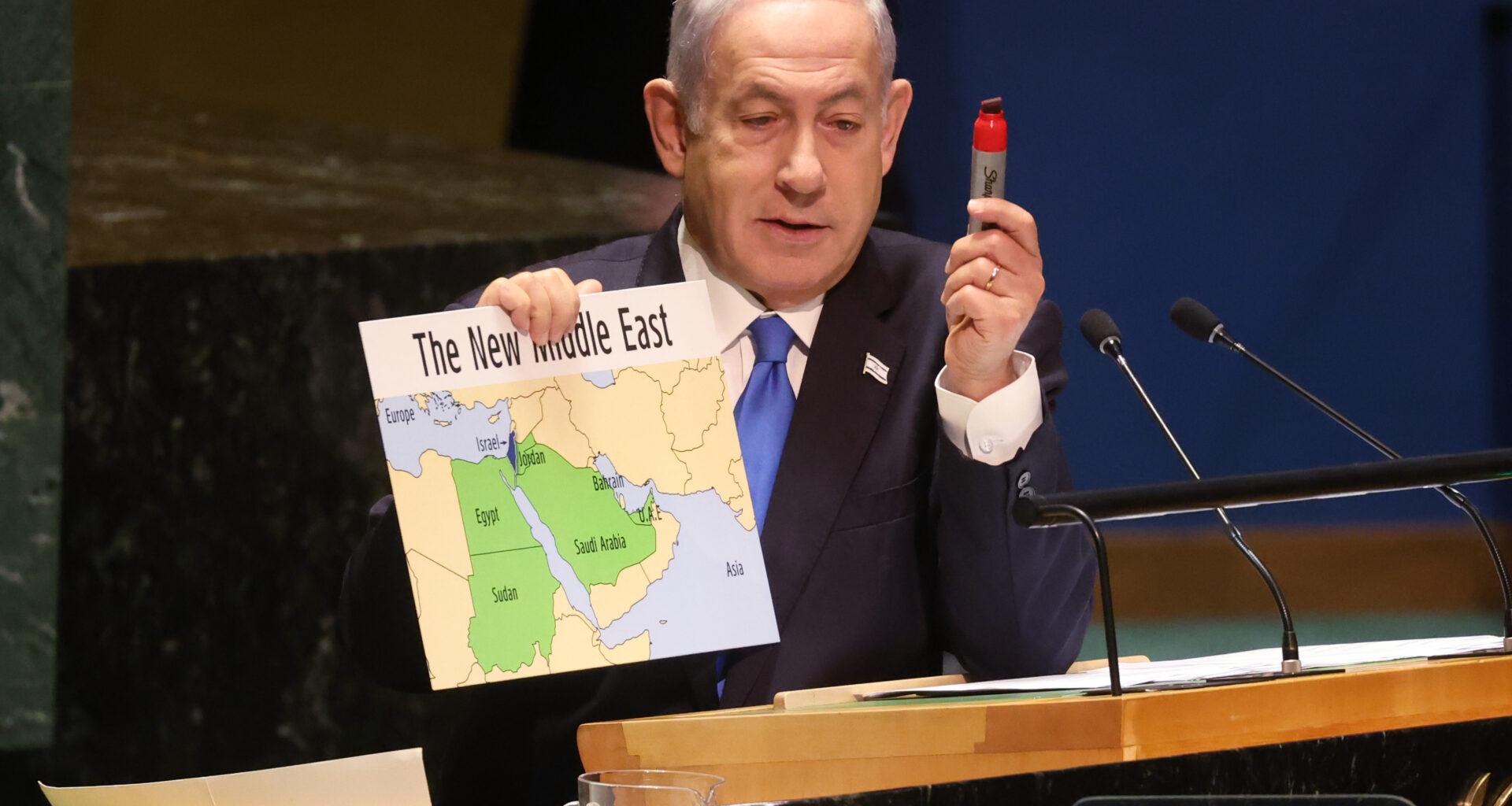In a wide-ranging interview, a senior Israeli diplomat has shared with Newsweek his nation’s strategy for realizing lasting change across several fronts that have been embroiled in a nearly two-year war, as well as addressing growing backlash emanating from allies, including the United States.
Just two weeks before the conflict erupted, Israeli Prime Minister Benjamin Netanyahu took to the podium at the annual United Nations General Assembly on September 22, 2023, to declare his vision for a “new Middle East,” which would “transform lands once ridden with conflict and chaos into fields of prosperity and peace.”
A key part of this new Middle East involved building upon the momentum of the 2020 U.S.-backed Abraham Accords to establish ties with Saudi Arabia, thus paving the way for normalizing Israel’s relationship with other Arab states. Another involved neutralizing the many threats Israel faced across its borders.
On October 7, 2023, efforts to realize the first goal came to a virtual halt as the Palestinian militant group Hamas launched what would become the deadliest attack in Israel’s history, sparking an ongoing war that has spread across the region and drawn in Israel’s top foe, Iran, directly.
Since then, Yuval Donio-Gideon, consul for public diplomacy at the Israeli Consulate General in New York, said, “Things have shifted dramatically in the Middle East.”
“Some of these things we look back at with great sorrow,” Donio-Gideon told Newsweek, “but some of these are really good opportunities for Israel and for neighboring people in the Middle East.”
He cited the Abraham Accords, which ultimately saw the United Arab Emirates, Bahrain, Sudan and Morocco normalize relations with Israel in a process backed by President Donald Trump‘s first administration, as a “genuine manifestation” of the opportunities available to regional countries who prioritize peace “before religious war, before hatred, before traditions of conflict.”
He also acknowledged that “in the Middle East, it’s always complicated,” with many diplomatic contacts taking place out of the public eye. Yet even with conflict still raging in multiple arenas, he saw “great potential for a better future for the people of the region,” including Palestinians, Lebanese, Syrians and Iranians.
“We think some of some of what’s happening [in the region] is definitely empowering such a trend and enabling leaders and people in our area to take decisions which are more influenced by what’s good for them and less by threats of war,” Donio-Gideon said.
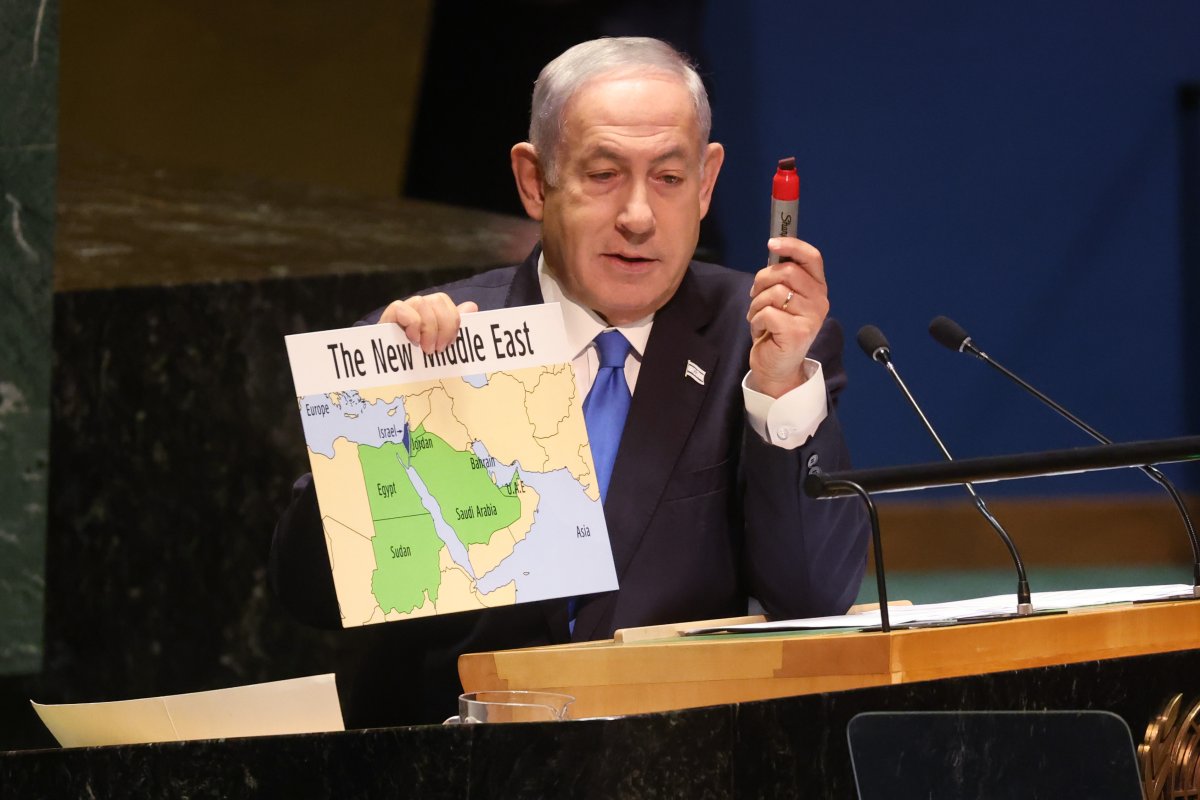
Israeli Prime Minister Benjamin Netanyahu addresses world leaders during the United Nations General Assembly on September 22, 2023, in New York City.
Israeli Prime Minister Benjamin Netanyahu addresses world leaders during the United Nations General Assembly on September 22, 2023, in New York City.
Spencer Platt/Getty Images
The Gaza Strip
While the 22-month conflict has spawned battles across at least seven fronts, the Gaza Strip remains at the heart of the war.
Efforts to establish even a limited ceasefire have repeatedly unraveled as both sides accuse the other of pushing unacceptable terms. Last week, as Hamas announced it had accepted a deal put forth by Egypt and Qatar, the Israeli military said a new operation to retake control of Gaza City from Hamas had been approved.
Donio-Gideon said that Israel was far more interested in seeking a lasting solution than a temporary cessation of hostilities. And while he said Israel was weighing what’s currently on the table, he argued that “the war could end tomorrow,” if only “the terrorists would release the hostages they kidnapped and put down their weapons.”
Since the early stages of the war, Netanyahu has outlined three goals, including the release of all hostages, the defeat of Hamas’ military and governing capabilities and the rendering of Gaza incapable of posing a future threat to Israel.
Though Hamas has suffered extensive losses in terms of equipment and manpower, including much of its core leadership, Donio-Gideon said that Hamas still “has capabilities,” pointing to a recent attack involving up to 100 personnel against an IDF stronghold in Gaza.
“I don’t think we have an illusion that we would kill or take out each and every last terrorist in Gaza,” Donio-Gideon said, “but we want to reach a situation in which Hamas’ government ability and military capabilities are reduced to the extent that there’s no longer an imminent threat to Israel or to Israelis that live very close to Gaza.”
Ending the rule of Hamas, which took power in Gaza in 2007, two years after the Israel Defense Forces (IDF) withdrew from a nearly four-decade occupation of the territory, would also “ensure a much better future for Gazan people,” he said.
But the question of who takes over looms heavy. Israeli officials have repeatedly emphasized that there was little interest in the IDF reasserting control over Gaza, while Netanyahu has announced that the Israeli military would indeed occupy the territory again, at least in the immediate postwar scenario.
Donio-Gideon explained that, ultimately, “the vision is to have some kind of self-ruling government in Gaza,” and made the distinction “between maintaining military capabilities to intervene and intercept terror and controlling the territory.”
“I think once Hamas is ousted and down from its power and not able to terrorize and intimidate the people of Gaza, you will also hear way more other voices in Gaza, which are more interested in improving their own life and less interested in fighting with Israel,” he said.
He hinted that there were already some individuals within the Palestinian political sphere “that could be thought of [as] potentially leaders” for Gaza. There exists “a whole variety of people that are sharing the power within, mostly the West Bank, but probably in future Gaza as well.”
“I’m not going to mention them, first and foremost because if you want to bury someone politically in the Palestinian political scenery, all you need to do is say that Israel supports them, that will do,” Donio-Gideon said.
“Since we want to leave a chance for these people to take over and lead the Palestinians, they need to have genuine support from within and, in parallel, not being identified as someone that the West or the U.S. or Israel has appointed,” he added, “because otherwise, in the current political environment within the Palestinians, they would be ruled out.”
The choice among Arab countries to lead Gaza is the Palestinian National Authority (PA), based in the West Bank and led by President Mahmoud Abbas.
Netanyahu, however, has expressed opposition to the PA in its current form, once again leading Gaza as it briefly did until the violent split that preceded Hamas’ takeover. Abbas, who has led without elections for 20 years, also faces accusations of corruption and waning popularity among Palestinians.
“In certain contexts, we have close cooperation with the Palestinian Authority, especially on security matters,” Donio-Gideon said. “However, we have a lot of divisions with them politically, and a lot of hostility from them towards the State of Israel politically.”
These divisions, on top of questions over his popularity, made it “hard to say” whether or not the 89-year-old leader would have a major say in Gaza’s future, according to Donio-Gideon.
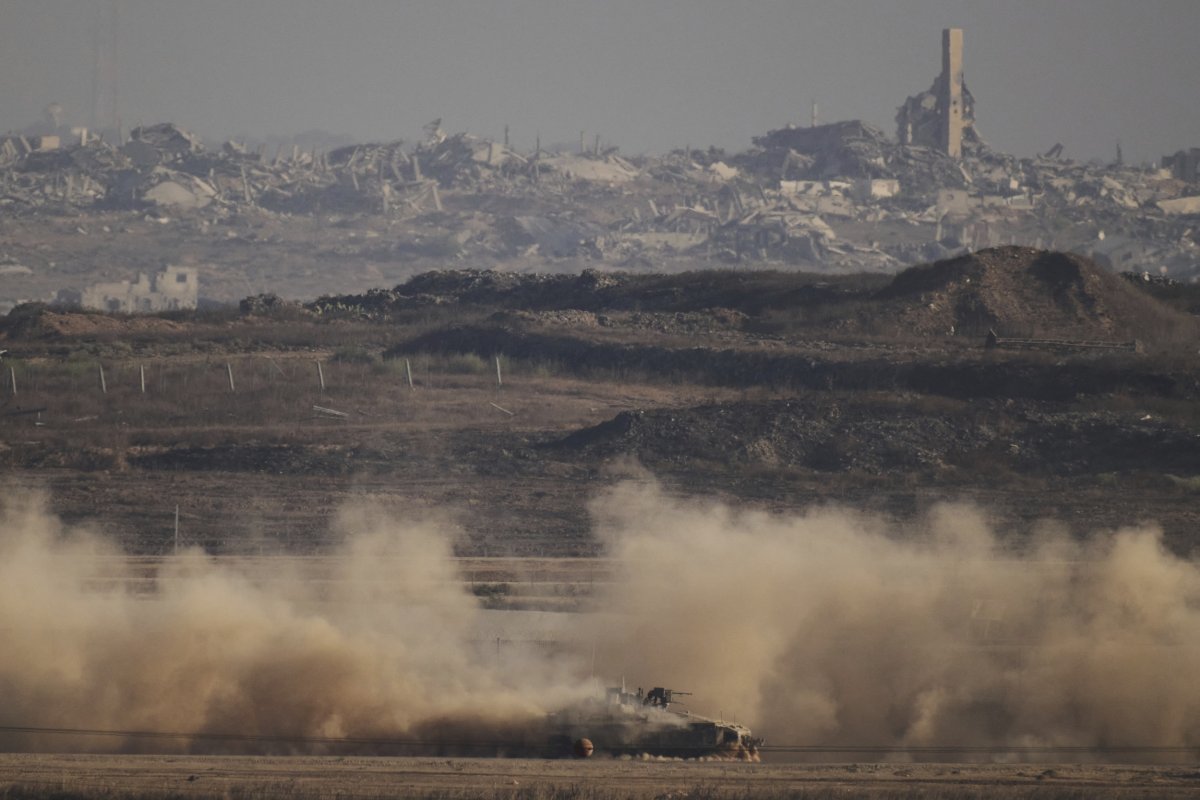
An Israeli armored personnel carrier moves through the Israeli-Gaza border, as seen from southern Israel, on August 25, 2025.
An Israeli armored personnel carrier moves through the Israeli-Gaza border, as seen from southern Israel, on August 25, 2025.
Leo Correa/AP
Lebanon
On the second day of the war, as Israel fought to clear out lingering fighters from Hamas and allied Palestinian factions in Israel and set the stage for a ground invasion of Gaza, the Lebanese Hezbollah movement entered the conflict by launching rockets and artillery across Israel’s northern border.
Hezbollah has long been considered one of the world’s most powerful non-state actors, forming a key front line force within the Iran-led Axis of Resistance movement, all of which would mobilize in support of Hamas throughout the war. Prior to the current conflict, Israel and Hezbollah, which is also a leading political party in Lebanon, had twice engaged in wars that involved Israeli invasions and subsequent Israeli withdrawals.
Israel and Lebanon have long accused one another of violating past agreements regarding the U.N. peacekeeper-patrolled buffer zone between their two nations. Last year, as Israel advanced in Gaza, Netanyahu ordered an intensification of operations on the Lebanese front that resulted in the killing of Hezbollah’s longtime leader, Secretary-General Hassan Nasrallah, and a ground incursion.
The two sides signed a ceasefire agreement in November, but Israel has continued to conduct hundreds of operations against stated Hezbollah positions in Lebanon, including a raid carried out on Monday. Israeli troops also maintain a presence in the country’s far south.
The Israeli attacks have been met with condemnation from Lebanese leadership, which now includes two critics of Hezbollah, President Joseph Aoun and Prime Minister Nawaf Salam. Last month, the Council of Ministers voted to move forward with a plan to oversee Hezbollah’s disarmament by the end of the year, an initiative rejected by the group, which continues to say it is committed to the ceasefire.
Netanyahu, for his part, welcomed the move. The Israeli leader announced Monday he would tie progress in Hezbollah’s disarmament with a gradual reduction of Israeli forces in southern Lebanon.
From Donio-Gideon’s perspective, he sees a “great opportunity for the region, for Israel, but first and foremost for the Lebanese to take control of their own state an decide which kind of country they want to live in.”
The chance has emerged in an environment that he said has been cultivated by a number of concurrent events, including the IDF’s targeting of Hezbollah, Israeli strikes against Iran-backed forces across the region and the fall of Iran-aligned Syrian President Bashar al-Assad at the hands of a lightning rebel offensive launched just days after the Israel-Hezbollah ceasefire agreement was signed late last year.
“All these events created an opportunity, which I’m not sure that if it’s turned down will come again in the near future,” Donio-Gideon said. “And given that the Lebanese will take this opportunity in both hands and will try to shape a society and a country that bears a real future for them, and again, occupied mostly in what’s good for Lebanese and not in what’s bad for Israelis, I think we’re willing to do substantial steps to facilitate.”
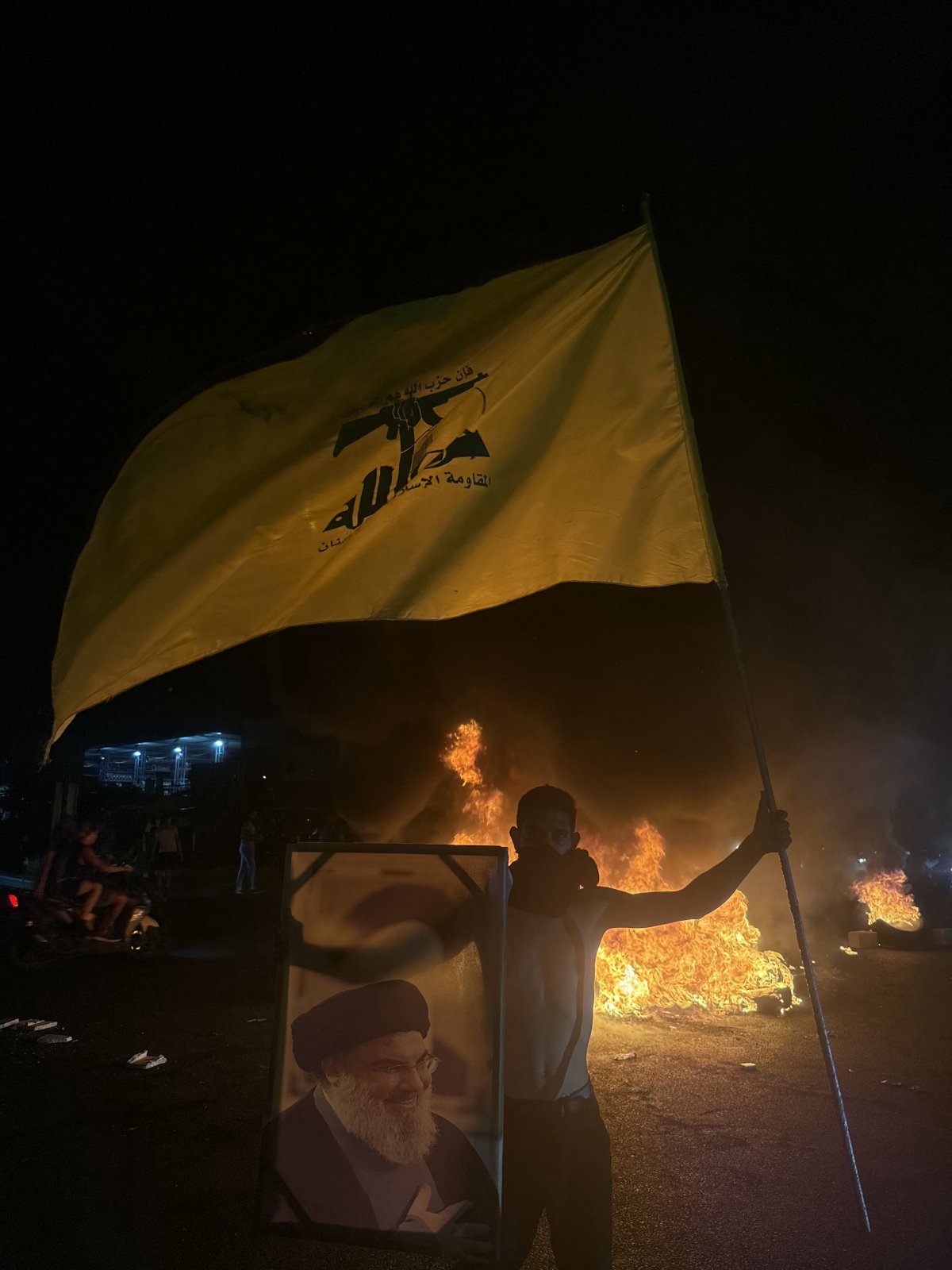
A Hezbollah supporter holds a portrait of late leader Hassan Nasrallah as followers block the streets and rally to protest the Lebanese government’s endorsement of a plan to disarm it, in Beirut’s southern suburbs on…
A Hezbollah supporter holds a portrait of late leader Hassan Nasrallah as followers block the streets and rally to protest the Lebanese government’s endorsement of a plan to disarm it, in Beirut’s southern suburbs on August 8, 2025.
More
IBRAHIM AMRO/AFP/Getty Images
Syria
Assad’s downfall marked a major setback for the Axis of Resistance, as Syria afforded a geographic connection to allow the movement of coalition personnel and equipment from Iran and Iraq to Lebanon, along with a direct front line with Israel along the occupied Golan Heights.
Yet the man who led the insurgent charge to end half a century of the Assad dynasty’s Ba’athist rule also poses new risks. Syrian Interim President Ahmad al-Sharaa, long known by his nom de guerre, Abu Mohammed al-Golani, formerly led Al-Qaeda‘s branch in Syria and was once an associate of Islamic State militant group (ISIS) founder Abu Bakr al-Baghdadi, whom he met while imprisoned by U.S. forces in Iraq two decades ago.
Sharaa has publicly rescinded jihadi ideology in recent years and, since coming to power in December, has vowed to oversee a more peaceful future for a country that has been in the throes of civil war since 2011. But his promises have been undermined by persistent reports of security forces and affiliated groups targeting minority communities, including Alawites, Druze and Kurds.
Israeli officials have been especially skeptical of Sharaa’s claims, with some still linking him or his followers to Islamist militant aims, even as Trump has embraced the new Syrian leader.
Violence between Syrian state-aligned forces and Druze militias has drawn in direct intervention from Israel, which has a substantial Druze community of its own. Netanyahu has accused Sharaa of allowing extremist elements to gather near the border, across which the Israeli premier ordered a historic set of strikes and sent troops to seize further territory in the immediate aftermath of Assad’s ouster.
Sharaa has repeatedly stated he had no intention of picking a fight with Israel, and reports have indicated that he was considering a peace deal, putting an end to a state of war between the two countries that predates even the Assad family’s rule.
Sharaa confirmed on Monday that his government was in “advanced talks” toward reaching a security agreement based on the 1974 armistice line established along the Golan Heights after the latest direct war fought between Israel and Syria a year earlier. He said he did not feel the conditions were yet set for a peace agreement but affirmed he “will not hesitate to take any agreement or decision that serves the interest of the country.”
Also complicating the equation is Trump’s close ties with Turkish President Recip Tayyip Erdogan, a NATO leader who has advocated for the budding ties between Washington and Damascus and at the same time warned Israel against further action in Syria.
Addressing the recent developments, Donio-Gideon said that Israeli officials “explore carefully, not only the statement, but also the deed of the new government in Syria, and within the context of Israel’s security and within the context of other vast interests that we have in the immediate area attached to Israel’s border.”
“We are open to come to relevant arrangements, hopefully sooner than later, with the government in Syria,” he said. “For many, many years, we aspired to do that, and there was a very clear ‘no’ on behalf of the Syrian side.”
“Now, things will be different, and we’ll see how it plays,” he added, noting how Israel would not in any scenario tolerate a buildup of hostile forces along its border.
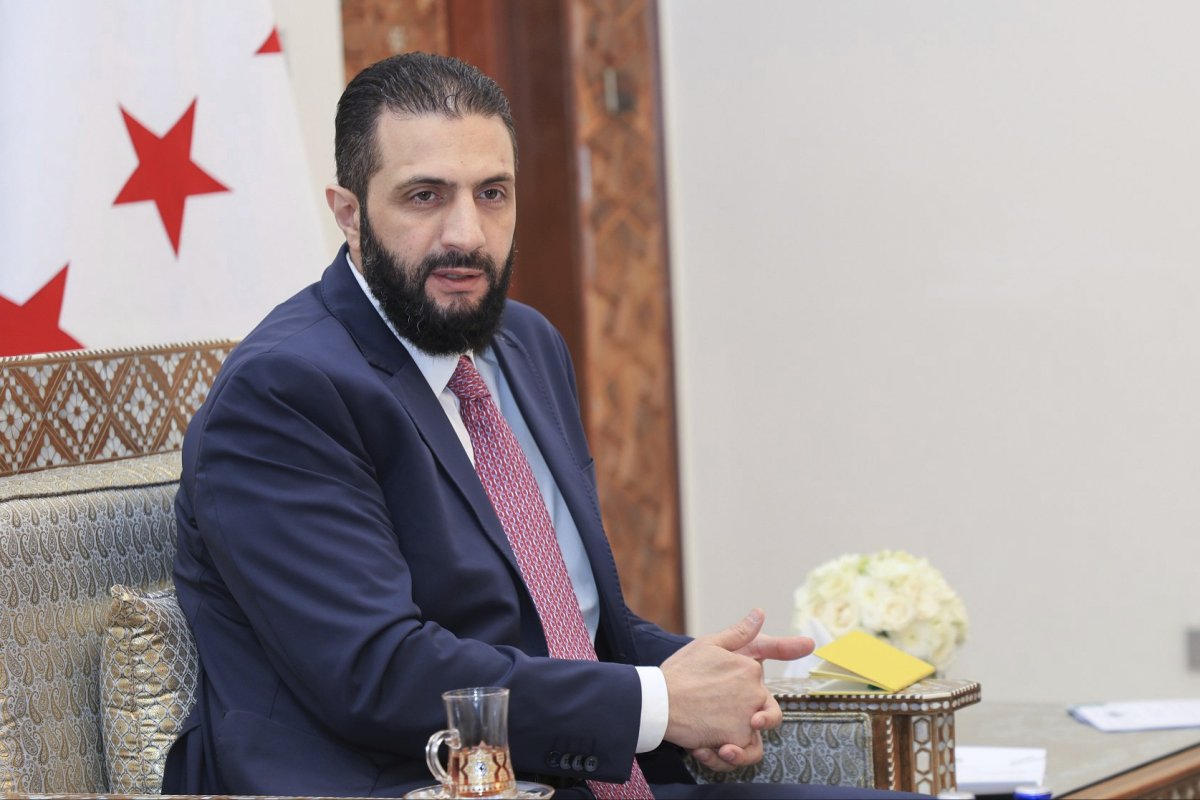
Syrian Interim President Ahmad al-Sharaa receives the final version of the provisional electoral system for the People’s Assembly, in Damascus, Syria, on July 27, 2025.
Syrian Interim President Ahmad al-Sharaa receives the final version of the provisional electoral system for the People’s Assembly, in Damascus, Syria, on July 27, 2025.
Syrian Arab News Agency/AP
Iran
Beyond the battles with powerful non-state actors of the Axis of Resistance, Israel has viewed its conflict with Iran as central to changing the paradigm across the Middle East.
The two nations twice exchanged direct fire last year and, in June, entered into what Trump would name the “12-Day War,” initiated by a sweeping series of Israeli strikes against sites and personnel tied to Iran’s nuclear program and military, and met by Iranian missile and drone salvos against Israel.
The war also saw the U.S. conduct an unprecedented series of strikes against three heavily fortified Iranian nuclear facilities, followed by Iran launching missiles at a U.S. base in Qatar shortly before Trump called a truce between the two parties.
While both Netanyahu and Trump have hailed their operations as a success, the Israeli premier’s calls for Iranians to rise up and overthrow their government have gone unrealized. His call was backed by some opposition groups in exile as well as some separatist groups within the country, but the Islamic Republic has stood firm.
Donio-Gideon argued that the “aim of the so-called ’12-Day War’ was not to overthrow the government in Iran,” but rather “to deal with the threat of military nuclear capabilities of Iran and the ballistic missile threat to Iran.”
That said, he predicted change would be on the horizon with the potential to reshape Israel’s relationship with Iran.
“If, or I’d like to believe when, a regime change will happen in Iran, it will be out of the decision of the people of Iran, not because someone from the outside will enforce that on them, that’s being honest,” he said. “Having said that, I’m also relatively optimistic, in the sense that when such a thing will happen, the Iranian state, the Iranian society, which has a very glorious heritage, has the economy and society to support and maintain a more plural regime.”
He pointed out that Israel did enjoy a positive relationship with Iran up until the 1979 Islamic Revolution that overthrew Shah Mohammad Reza Pahlavi, whose son championed Israel’s recent campaign against the country.
“If we’re about to see a change, or when we’re about to see a change in Iran, I hope it will last,” Donio-Gideon said. “And I hope to see Iranians flourishing and having good relations with Israel.”
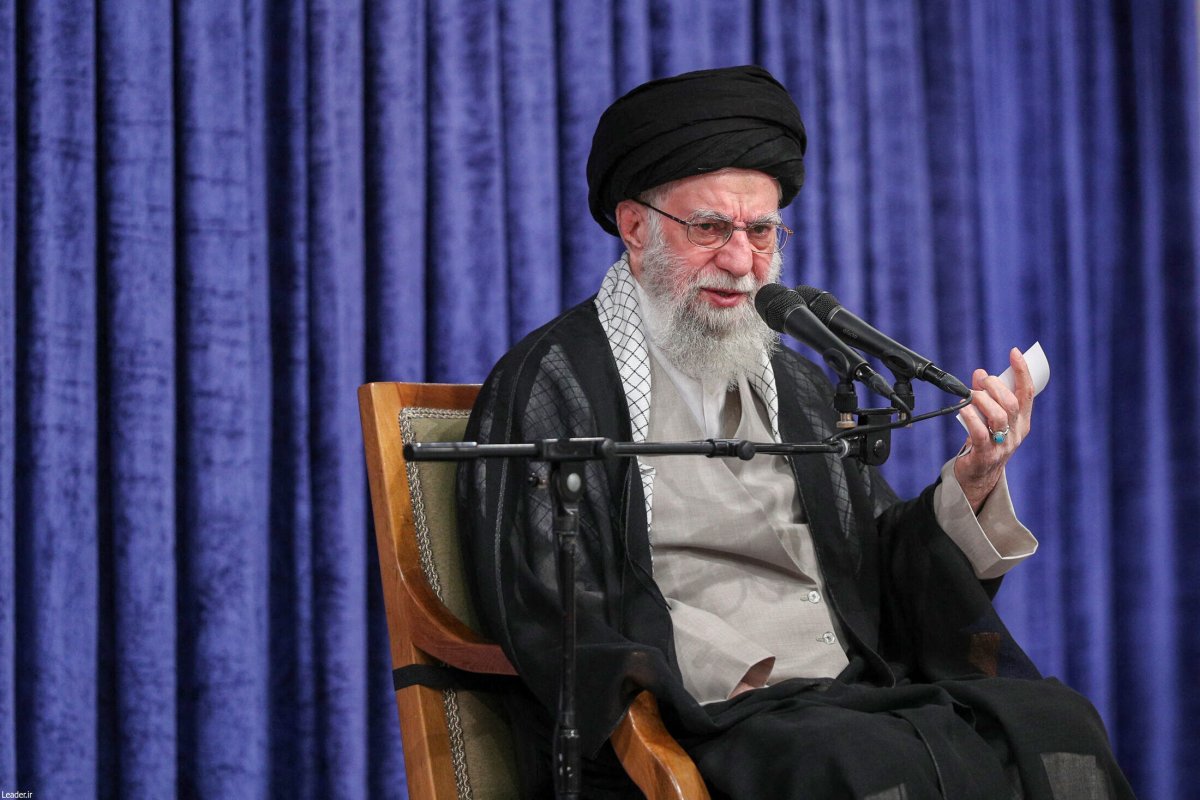
Iranian Supreme Leader Ayatollah Ali Khamenei speaks during a ceremony marking the death anniversary of the Shiite Eighth Imam Reza, in Tehran on August 24, 2025.
Iranian Supreme Leader Ayatollah Ali Khamenei speaks during a ceremony marking the death anniversary of the Shiite Eighth Imam Reza, in Tehran on August 24, 2025.
Office of the Iranian Supreme Leader/AFP/Getty Images
‘The Eighth Front’
Israeli officials have long described what’s become the longest and bloodiest war in their nation’s history as being fought on seven fronts against foes in Gaza, the West Bank, Lebanon, Iran, Iraq, Syria and Yemen.
With Syria’s Assad ousted from power, Hezbollah committed to its ceasefire deal with Israel, Iran sticking to its own postwar truce and the Islamic Resistance in Iraq also having paused operations against both Israel and U.S. troops in the region, many of the initial prewar threats have quieted for the time being.
Notably, Yemen’s Ansar Allah, also known as the Houthis, has continued to strike at Israel, launching a missile toward Tel Aviv on Friday that was met Sunday with Israeli raids on the capital Sanaa. As war rages in Gaza, violence in the West Bank has intensified as well.
But there’s another fight Israel is mired in, and that’s the war for public opinion.
The U.S., both under Trump and former President Joe Biden, has largely stood by its ally, but criticism has mounted from both supporters and critics of the current administration. And in Europe, a growing number of countries have outright condemned Israel’s actions on the battlefield and in limiting humanitarian assistance to Gaza.
The U.N. has consistently accused Israel and Hamas of war crimes. The International Criminal Court has issued warrants for the arrest of Netanyahu and his former defense minister, along with three Hamas leaders, all of whom are believed to have since been killed.
“There is reason to be concerned,” Donio-Gideon said. “My government, like any government, should be held accountable for its deed. That’s fine. There’s a major difference between being critical of policy and ruling out the existence or the legitimacy of a country to live peacefully, to protect its citizens.”
He described “the battle that we’re fighting on the diplomatic front” as the “eighth front, in addition to the seven military fronts that we have in the Middle East.” He said it’s also “a front in which we are trying to expose and share with our friends, both in America and in Europe, what we are doing, what’s the alternative.”
“We have a constant dialogue, even sometimes a critical dialogue with friends, about what can we do, what should be done,” Donio-Gideon said. “We’re not always agreeing on everything, but I must tell you, and I’m over a decade involved in one way or another in Israel-American relations, there’s still a very genuine bipartisan support for Israel.”
Donio-Gideon remained confident in this trend even as influential voices within Trump’s MAGA faction have turned on Israel in recent months, a phenomenon the Israeli diplomat said “is something that really has to do with internal political affairs which we’re really keeping a distance from.”
“We know that the American administration probably, as it should, looks first and foremost on what’s good for America,” Donio-Gideon said. “And we believe that in so many cases it aligns with what’s good for Israel. And, anyway, we have a very close dialogue between friends, and I think relations are as solid as they’ve ever been.”
“If it changes in a way, it’s an internal political American thing,” he added. “We respect anything that the American people choose and decide, or elected officials choose and decide. It’s not our vote involved in that.”
